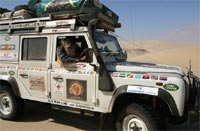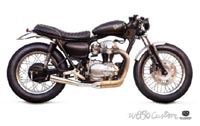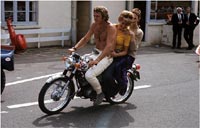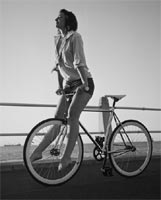
Top stories




ESG & Sustainability#BudgetSpeech2026: SRD grant unchanged, other Sassa social grants see hike
5 hours


More news











ESG & Sustainability
South Africa’s carbon tax should stay: climate scientists explain why










When I was working in advertising, people would often be late for meetings using the convenient excuse that they were stuck in traffic, myself included. Strangely, few people questioned it even though we should be able to anticipate traffic - after all, we encounter it most of our working lives.
I tried honesty once: I said I overslept. Daggers, I tell you, but no one batted an eyelid when I started blaming traffic once again, an obvious lie since I rode a motorcycle to work by then.
Many of us have been adding to it day by day. I've worked on five car and two fuel brands; sold BMWs, Land Rovers, Volkswagens, Jaguars and Fords (probably only three Fords; the campaign was rubbish so I feel better about that). I've filled every car imaginable with Engen and BP, and I've crept to and from meetings in my own gas guzzling Land Rover, Mitsubishi Pajero and V8 Volksiebus/conversion in an agonisingly slow tide of metal, not acknowledging that the purpose of those meetings was to put even more metal on the road.
As advertisers, we've manufactured a devotion to cars and a thirst for fuel that keeps us jamming up the roads in these beloved symbols of independence, the cloaks that denote our identity - the more expensive, the better. We are loath to welcome others into these hallowed spaces: spare seats sit empty, we take up unnecessary space on the road and burn more fuel than we should.
As fuel takes the biggest hike since 2008, commuters lean out of car windows and say to reporters, "I don't know how I'm going to cope," or "How can we afford to eat?" Economists insinuate that we must cut back on other expenses. Other expenses? It's embarrassing, this, in a country that coined the phrase "'n boer maak a plan".

Are you Kingsley Holgate or Steve McQueen?
But there are obvious alternatives: First off, folks who aren't Kingsley Holgate or real "boere" working on real farms need to stop re-enacting the Groot Trek in cumbersome wagons that use more ox power than they need.
Many argue that their beloved SUVs and 4x4s are used for family trips to the bush or the beach, but the great majority of the time they are used to commute, drop the kids off at school, attend the rugby match and so on. Most of all, they are used to pose (I was clearly a poser because I never had kids, I care more for synchronised swimming than rugby and only went to the bush once a year).
But all this racks up enormous costs in fuel and maintenance and screws the environment up royally. It doesn't take a mathematician to figure out that owning a regular vehicle and hiring one of these beasts for the holidays is far more economical.

Another solution is right there at the front of the queue for the traffic light: the motorcycle.
These two-wheel marvels are infinitely cheaper than cars, slim enough to slip between them (it is actually legal for a motorcycle to share a lane with a car) and come in such great variety that there is one to suit every identity. There are even bikes for hipsters, a market not even carmakers have managed to corner.

With a cool head and a calm hand on the motorcycle throttle, a commute becomes a breeze.
Yes, riding a motorcycle has its hazards. Riders are harder to see on the road, but it is not just a case of size. One of the key faults is that there are so few on the road therefore drivers hardly consider them - they look out for cars, not bikes. But the more bikes we see on the road, the more aware we will become of them.
Cape Town has a great number of cyclists. More money is spent on Lycra in this city than any other (of course, there may be other influential factors). It hosts the largest timed cycling event in the world but it is only during the Argus and the weekends that we hear the click-clack of cycling shoes at the café. During the week, the cycle lanes are almost deserted and the cute little bicycle traffic lights flicker for a non-existent audience.
If you live within a reasonable distance from work, cycling makes so much sense. Besides saving fuel, alleviating congestion and reducing your carbon footprint, the bonus is fitness. The same can be said for jogging and, if any decent size office doesn't have showers and changerooms, maybe it should get them and encourage staff to jog or cycle to work.

As advertisers and marketers with immense talent and power, the industry should make an effort to change things, not just by altering our own behaviour but by persuading consumers to change. It is, after all, what this industry does best, and it is this industry that is largely responsible for the jam we are stuck in. Ons moet 'n plan maak.
Have you seen any good motorcycle or bicycle advertising lately? If the golden pencil is your carrot and you want to be a part of something significant, here's an opportunity. Instead of begging insignificant corner shops to let you do "award-winning" advertising for them, go after the many motorcycle and bicycle brands out there and effect real change through great advertising.
And, most importantly, stick with it.
Don't do that one-off shit you only ever see in award shows. Grow the brand. Show people the advantages of two wheels over four. Sell millions of bikes. Alleviate congestion. Get to the meeting on time and, when someone asks why you are late, don't blame traffic.
